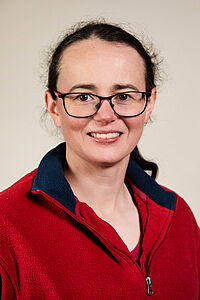
Dr. Carolyn-Monika Görres
D-65366 Geisenheim
Room 01.02
Von-Lade-Straße 2
65366 Geisenheim
Project start: 01.01.2025
Project end: 31.12.2026
Sponsor: Federal Office for Agriculture and Food
The aim of the PK-BODENABC project is to characterise long-term changes in soils more than 10 years after application of biochar (BC) at four different sites with soil properties ranging from sandy to loamy to clayey, in order to answer the question of whether additive soil carbon storage occurs and whether positive or negative effects are to be expected in the long term. The investigations focus on a number of soil fertility parameters (soil biological and physico-chemical parameters) as well as on a possible additional soil C storage over the past decade beyond the BC application; and exemplarily on the C retention of fresh assimilates in "old" BC soils (13C pulse labeling-tracing). In addition to the influence on C retention, it will also be quantified whether nitrogen (N) losses (including N2O, nitrate) in these soils are reduced in the long term. The project will also use ISO- and OECD-standardised terrestrial and aquatic ecotoxicological effect tests to examine effects on soil fauna (reproduction tests) and on the leachability of pulse-applied pesticides frequently used in agriculture, which can normally enter groundwater and surface water and, according to current knowledge, are possibly better retained in biochar soils, which should be visible in the effects on soil and aquatic fauna.
Project start: 01.01.2024
Project end: 31.12.2025
Sponsor: German Academic Exchange Service
Pakistan's national GHG budget is not based on real measurements but on IPCC factors as there is no infrastructure to measure stable greenhouse gases (N2O, CH4, CO2). Therefore, the actual GHG emissions could be misjudged and awareness of mitigation measures is lacking. A novel technique (MIRA; https://aerissensors.com/) enables the measurement of GHG concentrations with a robust portable analyzer directly in the field with higher precision at lower costs than gas chromatography. The Kammann Group has a MIRA CO2/N2O analyzer. In "AssessGHG-RemoveC", annual GHG Summer Schools are planned in Germany in 2024 and 2025, where 6 and 7 Pakistani scientists respectively will be trained together with 10 young German scientists. The Pakistani participants undertake to pass on what they have learned in a GHG workshop at NUST (multiplier approach); HGU colleagues provide support and bring measuring equipment. The GHG workshop in Pakistan takes place at the same time as a Biochar Academy. The production and use of Biochar is an established CDR (carbon dioxide removal) technology that combines C sinks in soils with many advantages for agriculture in subtropical/tropical climates. The aim is to incentivize rural Biochar production and use through the growing global trade in carbon sinks. A new certification guideline for countries with smallholder farming has created the conditions for C-sink payments to smallholders. To this end, annual Biochar Academies are held at NUST in Pakistan with the support of the International Biochar Initiative and Carbon Standards International. Workshops / academies are designed for networking and are problem-oriented.


